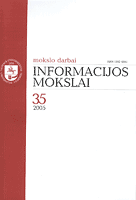Communication behaviour of Lithuanian 'hosts' in meetings with foreigners ('strangers')
Communication behaviour of Lithuanian 'hosts' in meetings with foreigners ('strangers')
Author(s): Elena MacevičiūtėSubject(s): Economy
Published by: Vilniaus Universiteto Leidykla
Summary/Abstract: The opening up of the societies in Eastern Europe has brought their inhabitants into close contacts with the people from all over the world who may be regarded as strangers. A stranger is someone who is physically present, participating in the same situation as the other members of the group, but is outside the situation and at the same time is not the member of the group. The presentation summarises the findings of a small research project conducted in Lithuania in spring of 2002 and 2003. The goal of the project was to investigate what are the features of communication behaviour of Lithuanian managers as ‘hosts’ when they meet with foreign partners in business situations and whether they perceive the situation and their behaviour as different from the contacts with local partners. Gudykunst’s anxiety and uncertainty management theory became a framework for the project. The observation and interviews with Lithuanian hosts were the main methods used in the project. The outcome shows that Lithuanian managers have good communication skills and can manage their anxiety and uncertainty levels when communication with foreign guests. Non-managers in home situations encounter more problems and are not always capable to manage anxiety and uncertainty.
Journal: Informacijos mokslai
- Issue Year: 2005
- Issue No: 35
- Page Range: 119-135
- Page Count: 17
- Language: English

